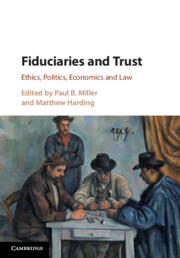Book contents
- Fiduciaries and Trust
- Fiduciaries and Trust
- Copyright page
- Dedication
- Contents
- Contributors
- Acknowledgements
- Introduction
- Part I Personal Trust and Fiduciary Relationships
- Part II Personal Trust and Fiduciary Duties
- 6 Stakeholder Fiduciaries
- 7 Trustees and Agents Behaving Badly
- 8 Conflict, Profit, Bias, Misuse of Power
- Part III Political Trust and Fiduciary Government
- Part IV Trust and Fiduciary Law in Context
- Index
7 - Trustees and Agents Behaving Badly
When and How Is ‘Bad Faith’ Relevant?
from Part II - Personal Trust and Fiduciary Duties
Published online by Cambridge University Press: 13 March 2020
- Fiduciaries and Trust
- Fiduciaries and Trust
- Copyright page
- Dedication
- Contents
- Contributors
- Acknowledgements
- Introduction
- Part I Personal Trust and Fiduciary Relationships
- Part II Personal Trust and Fiduciary Duties
- 6 Stakeholder Fiduciaries
- 7 Trustees and Agents Behaving Badly
- 8 Conflict, Profit, Bias, Misuse of Power
- Part III Political Trust and Fiduciary Government
- Part IV Trust and Fiduciary Law in Context
- Index
Summary
Acting in good faith is an elemental requirement in fulfiling duties where the rightholder has reposed trust or faith in the dutyower. Sometimes, these dutyowers are fiduciaries. From an ethical perspective an essential feature of the trust and agency relationships is that a principal is entitled to repose ‘trust’ in a trustee or agent – by ‘trust’ I mean the commonsense notion of trust, not the technical legal relationship of trustee and beneficiary. Even so, the practical relevance of the duty is typically misunderstood, in part because of common misunderstandings about the good faith duty’s relationship with fiduciary powers, trustworthiness, and good will. Acting in bad faith is a breach of faith or trust that has relevance to isolated pockets of trust and agency law. At an abstract and general level, where a trustee or agent acts in bad faith this allows the principal or the court to remove the trustee or agent, extinguishing his right to that role. The duty of good faith has nothing in particular to do with the exercise of fiduciary powers.
Information
- Type
- Chapter
- Information
- Fiduciaries and TrustEthics, Politics, Economics and Law, pp. 128 - 148Publisher: Cambridge University PressPrint publication year: 2020
Accessibility standard: Unknown
Why this information is here
This section outlines the accessibility features of this content - including support for screen readers, full keyboard navigation and high-contrast display options. This may not be relevant for you.Accessibility Information
- 4
- Cited by
